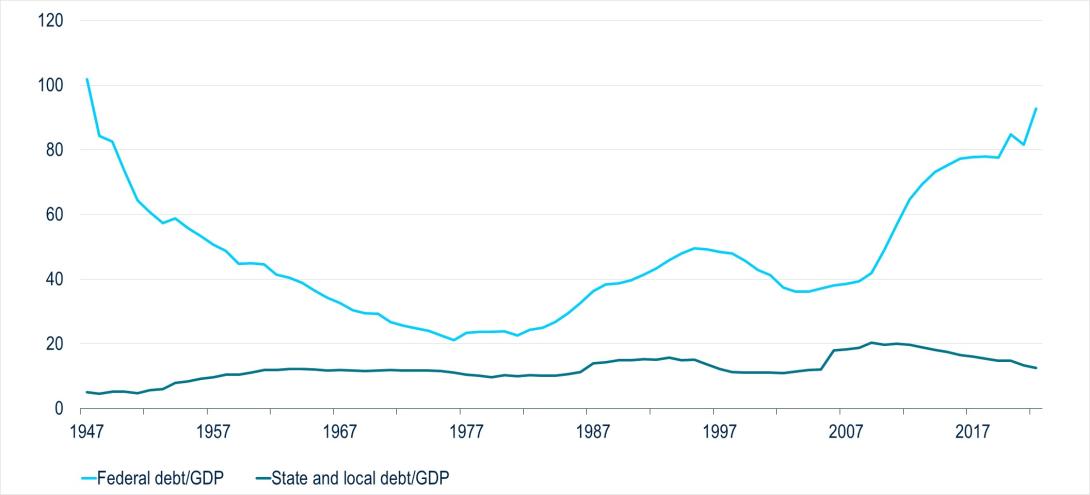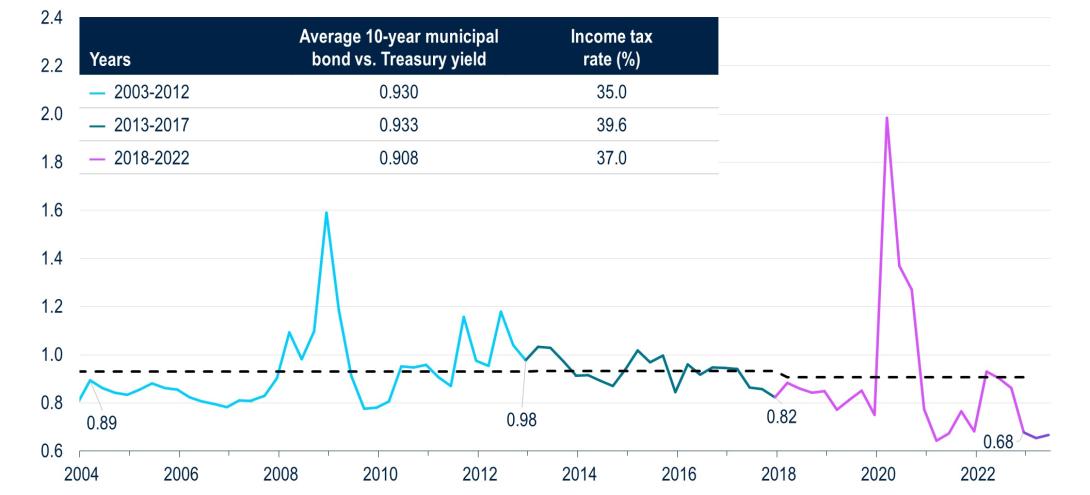The Limited Impact of the U.S. Downgrade on Munis

Fitch Ratings recently became the second of the three major ratings agencies to downgrade the U.S. long-term debt rating to AA+, below the AAA rating currently assigned to twelve U.S. states.1 While somewhat counterintuitive, this relationship is not surprising. U.S. states benefit from numerous structural strengths and constraints that encourage a fiscal discipline consistent with credit ratings higher than that of the sovereign. While states are impacted by the policies and performance of the U.S. government, the credit quality of states as a group is not constrained by the U.S. sovereign rating and we don’t expect the U.S. downgrade to have an outsized impact on muni bond valuations going forward. Ultimately, state credit quality hinges on each state’s ability to allocate resources to meet demands which are limited only by the constraints of its own economic environment and governance framework. As such, credit quality varies across states, and is not directly dependent on the sovereign rating of the U.S.
U.S. states benefit from structural advantages that collectively provide sufficient autonomy to allow for higher ratings than the U.S. sovereign. First, states’ autonomy to manage their obligations is nearly unlimited. A state’s ability to impair a contract has been upheld by the U.S. Supreme Court (US Trust v New Jersey 1974, Home Building & Loan v Blaisdell 1974) provided it can show it is reasonable and necessary to do so. Further, states enjoy a high degree of operating flexibility, given their unlimited taxing power and broad, diverse tax bases. States also have substantial autonomy over the spending side of the budget. For example, while not always politically easy, states have the authority to reduce or delay aid to local governments during periods of economic weakness.
Fiscal Discipline
While states enjoy substantial autonomy, they do face certain constraints which encourage fiscal discipline. Most notably, states are bound by their constitutions to balance their budgets. This requirement varies by state in terms of stringency. For example, there is substantial variation in terms of how revenues are estimated and the process by which the budget is approved. Further, states have varying requirements related to the maintenance of budget balances throughout the fiscal year, largely related to the power of the governor to impose mid-year budget adjustments. Nevertheless, state balanced budget requirements provide a baseline level of fiscal accountability.
States’ ongoing need to access the capital markets also creates a strong incentive for debt repayment. While the generally high credit quality of states reflects the structural strengths of the sector, in certain instances credit quality is enhanced by constitutional or statutory provisions that insulate debt repayment from any ongoing operating stress. For example, California’s constitutional payment prioritization system and Illinois’ statutory debt repayment mechanics strengthen the security pledge behind those states’ GO bonds. Unlike other sub-sovereign issuers (e.g., Canadian provinces), U.S. states borrow primarily to fund capital investment. As they are not reliant on capital markets for debt repayment, states retain flexibility to optimize the timing of bond issuances.
Federal Support
In addition, states benefit from the U.S.’s macroeconomic and structural strengths. These include the nation’s strong rule of law and respect for property rights, which underpins bondholder security, as well as the nation’s sound and well-regulated banking and financial systems. While we do not assume the federal government will backstop state operations or debt payments, states have historically benefited from federal aid (FEMA) following natural disasters or events such as the 9/11 attacks. At the same time, states are required to fund fewer services than the U.S. government, leading to lower debt-to-GDP (Figure 1). For example, the federal government must fund defense, social security and Medicare, in addition to a substantial share of safety net services (including Medicaid) in partnership with states and local governments.
Figure 1: Federal versus State and Local Debt to GDP (%)

Source: PGIM, St. Louis Federal Reserve January 1, 2023.
As noted above, state balanced budget requirements generally provide a baseline level of fiscal discipline and thereby reduce the potential for political turmoil. This is in stark contrast to the federal government, as Fitch alluded to in its rationale for downgrading the U.S. Nevertheless, some market observers point to the U.S. government’s ability to “print money” to support their belief in the primacy of the U.S. government’s credit. However, we believe the U.S. government’s ability to roll operating deficits forward presents a moral hazard as the lack of accountability allows for irresponsible fiscal and budget policies. While state governments are not immune to political rancor, they are generally able reach consensus.
Federal Impacts on State Credit
Despite their inherent strength and sovereign status, state credit quality may be impacted both directly and indirectly by federal policies, and these impacts are factored into our state credit ratings. For example, states have little control over the amount of federal funding they receive and are subject to federal spending mandates. Most notably, proposals that would alter the federal funding of Medicaid, a shared state-federal program, could have significant and direct implications for state budgets. State economic trajectories are also directly affected by federal policies and priorities, as we see in the impacts of the allocation of COVID-19 stimulus funding or in the imposition of the SALT deduction cap. Finally, states with relatively high exposure to federal employment and/or procurement are indirectly vulnerable to budget cuts during periods of federal fiscal consolidation. In these ways, individual states may be impacted, either positively or negatively, by the actions of the federal government.
The potential for federal government dysfunction to impede state credit quality is notably reflected in our ratings for Grant Anticipation Revenue Vehicle (GARVEE) bonds, which are secured by grants of federal transportation funds and typically have maturities that extend beyond current federal highway funding authorizations. Absent a backup pledge of state revenues, timely congressional action is necessary to maintain the flow of pledged funds for these bonds. Ratings on GARVEE bonds tend to be materially lower than state ratings (generally in the A category in the absence of an additional state revenue pledge), to account for this reauthorization risk.
Limited Impact on Valuations
We also find that AAA municipal bond yields (which reflect the value of AAA states) can fluctuate in value relative to Treasury yields, even within the same tax rate regime (Figure 2).
Figure 2: 10-Yr Muni v. Treasury Ratio

Source: MMD, Bloomberg, PGIM as of June 30, 2023.
Fluctuations in the municipal/treasury yield ratio reflect a number of factors, including liquidity, supply/demand dynamics and other technical/fundamental changes. However, we don’t believe the U.S. downgrade will inform this ratio any more than the factors previously mentioned. In fact, after S&P downgraded the U.S. government rating on August 5, 2011, municipal/Treasury yield ratios implied Treasuries were more attractive than their municipal counterparts based on the ratio moving higher through the end of the year.
As co-equal sovereigns that pre-date the creation of the U.S. federal government, U.S. state ratings are not constrained by the U.S. sovereign rating. Although state credit quality is impacted by the policies and performance of the U.S. government, states benefit from numerous structural strengths which collectively provide sufficient autonomy for state ratings to remain higher than the U.S. sovereign rating. Though a U.S. downgrade may inform muni bond valuations over time, other factors such as state credit quality, liquidity, and other technical factors are likely to have a more outsized impact.
1 South Carolina has two AAA ratings and Ohio and Washington has one AAA rating apiece.
Read More From PGIM Fixed Income
The comments, opinions, and estimates contained herein are based on and/or derived from publicly available information from sources that PGIM Fixed Income believes to be reliable. We do not guarantee the accuracy of such sources or information. This outlook, which is for informational purposes only, sets forth our views as of this date. The underlying assumptions and our views are subject to change. Past performance is not a guarantee or a reliable indicator of future results.
Source(s) of data (unless otherwise noted): PGIM Fixed Income, as August 25, 2023.
For Professional Investors only. Past performance is not a guarantee or a reliable indicator of future results and an investment could lose value. All investments involve risk, including the possible loss of capital.
PGIM Fixed Income operates primarily through PGIM, Inc., a registered investment adviser under the U.S. Investment Advisers Act of 1940, as amended, and a Prudential Financial, Inc. (“PFI”) company. Registration as a registered investment adviser does not imply a certain level or skill or training. PGIM Fixed Income is headquartered in Newark, New Jersey and also includes the following businesses globally: (i) the public fixed income unit within PGIM Limited, located in London; (ii) PGIM Netherlands B.V., located in Amsterdam; (iii) PGIM Japan Co., Ltd. (“PGIM Japan”), located in Tokyo; (iv) the public fixed income unit within PGIM (Hong Kong) Ltd. located in Hong Kong; and (v) the public fixed income unit within PGIM (Singapore) Pte. Ltd., located in Singapore (“PGIM Singapore”). PFI of the United States is not affiliated in any manner with Prudential plc, incorporated in the United Kingdom or with Prudential Assurance Company, a subsidiary of M&G plc, incorporated in the United Kingdom. Prudential, PGIM, their respective logos, and the Rock symbol are service marks of PFI and its related entities, registered in many jurisdictions worldwide.
These materials are for informational or educational purposes only. The information is not intended as investment advice and is not a recommendation about managing or investing assets. In providing these materials, PGIM is not acting as your fiduciary. PGIM Fixed Income as a general matter provides services to qualified institutions, financial intermediaries and institutional investors. Investors seeking information regarding their particular investment needs should contact their own financial professional.
These materials represent the views and opinions of the author(s) regarding the economic conditions, asset classes, securities, issuers or financial instruments referenced herein. Distribution of this information to any person other than the person to whom it was originally delivered and to such person’s advisers is unauthorized, and any reproduction of these materials, in whole or in part, or the divulgence of any of the contents hereof, without prior consent of PGIM Fixed Income is prohibited. Certain information contained herein has been obtained from sources that PGIM Fixed Income believes to be reliable as of the date presented; however, PGIM Fixed Income cannot guarantee the accuracy of such information, assure its completeness, or warrant such information will not be changed. The information contained herein is current as of the date of issuance (or such earlier date as referenced herein) and is subject to change without notice. PGIM Fixed Income has no obligation to update any or all of such information; nor do we make any express or implied warranties or representations as to the completeness or accuracy.
Any forecasts, estimates and certain information contained herein are based upon proprietary research and should not be interpreted as investment advice, as an offer or solicitation, nor as the purchase or sale of any financial instrument. Forecasts and estimates have certain inherent limitations, and unlike an actual performance record, do not reflect actual trading, liquidity constraints, fee. These materials are not intended as an offer or solicitation with respect to the purchase or sale of any security or other financial instrument or any investment management services and should not be used as the basis for any investment decision. PGIM Fixed Income and its affiliates may make investment decisions that are inconsistent with the recommendations or views expressed herein, including for proprietary accounts of PGIM Fixed Income or its affiliates.
Investing in the bond market is subject to risks, including market, interest rate, issuer, credit, inflation risk, and liquidity risk. The value of most bonds and bond strategies are impacted by changes in interest rates. Bonds and bond strategies with longer durations tend to be more sensitive and volatile than those with shorter durations; bond prices generally fall as interest rates rise, and low interest rate environments increase this risk. Reductions in bond counterparty capacity may contribute to decreased market liquidity and increased price volatility. Bond investments may be worth more or less than the original cost when redeemed. Mortgage- and asset-backed securities may be sensitive to changes in interest rates, subject to early repayment risk, and while generally supported by a government, government agency or private guarantor, there is no assurance that the guarantor will meet its obligations. High yield, lower-rated securities involve greater risk than higher-rated securities; portfolios that invest in them may be subject to greater levels of credit and liquidity risk than portfolios that do not. Investing in foreign-denominated and/or -domiciled securities may involve heightened risk due to currency fluctuations, and economic and political risks, which may be enhanced in emerging markets. Currency rates may fluctuate significantly over short periods of time and may reduce the returns of a portfolio. Commodities contain heightened risk, including market, political, regulatory and natural conditions, and may not be suitable for all investors. Diversification does not ensure against loss.
In the United Kingdom, information is issued by PGIM Limited with registered office: Grand Buildings, 1-3 Strand, Trafalgar Square, London, WC2N 5HR. PGIM Limited is authorised and regulated by the Financial Conduct Authority (“FCA”) of the United Kingdom (Firm Reference Number 193418). In the European Economic Area (“EEA”), information is issued by PGIM Netherlands B.V., an entity authorised by the Autoriteit Financiële Markten (“AFM”) in the Netherlands and operating on the basis of a European passport. In certain EEA countries, information is, where permitted, presented by PGIM Limited in reliance of provisions, exemptions or licenses available to PGIM Limited under temporary permission arrangements following the exit of the United Kingdom from the European Union. These materials are issued by PGIM Limited and/or PGIM Netherlands B.V. to persons who are professional clients as defined under the rules of the FCA and/or to persons who are professional clients as defined in the relevant local implementation of Directive 2014/65/EU (MiFID II). In certain countries in Asia-Pacific, information is presented by PGIM (Singapore) Pte. Ltd., a Singapore investment manager registered with and licensed by the Monetary Authority of Singapore. In Japan, information is presented by PGIM Japan Co. Ltd., registered investment adviser with the Japanese Financial Services Agency. In South Korea, information is presented by PGIM, Inc., which is licensed to provide discretionary investment management services directly to South Korean investors. In Hong Kong, information is provided by PGIM (Hong Kong) Limited, a regulated entity with the Securities & Futures Commission in Hong Kong to professional investors as defined in Section 1 of Part 1 of Schedule 1 (paragraph (a) to (i) of the Securities and Futures Ordinance (Cap.571). In Australia, this information is presented by PGIM (Australia) Pty Ltd (“PGIM Australia”) for the general information of its “wholesale” customers (as defined in the Corporations Act 2001). PGIM Australia is a representative of PGIM Limited, which is exempt from the requirement to hold an Australian Financial Services License under the Australian Corporations Act 2001 in respect of financial services. PGIM Limited is exempt by virtue of its regulation by the FCA (Reg: 193418) under the laws of the United Kingdom and the application of ASIC Class Order 03/1099. The laws of the United Kingdom differ from Australian laws. In Canada, pursuant to the international adviser registration exemption in National Instrument 31-103, PGIM, Inc. is informing you that: (1) PGIM, Inc. is not registered in Canada and is advising you in reliance upon an exemption from the adviser registration requirement under National Instrument 31-103; (2) PGIM, Inc.’s jurisdiction of residence is New Jersey, U.S.A.; (3) there may be difficulty enforcing legal rights against PGIM, Inc. because it is resident outside of Canada and all or substantially all of its assets may be situated outside of Canada; and (4) the name and address of the agent for service of process of PGIM, Inc. in the applicable Provinces of Canada are as follows: in Québec: Borden Ladner Gervais LLP, 1000 de La Gauchetière Street West, Suite 900 Montréal, QC H3B 5H4; in British Columbia: Borden Ladner Gervais LLP, 1200 Waterfront Centre, 200 Burrard Street, Vancouver, BC V7X 1T2; in Ontario: Borden Ladner Gervais LLP, 22 Adelaide Street West, Suite 3400, Toronto, ON M5H 4E3; in Nova Scotia: Cox & Palmer, Q.C., 1100 Purdy’s Wharf Tower One, 1959 Upper Water Street, P.O. Box 2380 - Stn Central RPO, Halifax, NS B3J 3E5; in Alberta: Borden Ladner Gervais LLP, 530 Third Avenue S.W., Calgary, AB T2P R3.
© 2023 PFI and its related entities.
2023-6335
Sign Up Now for Full Access to Articles and Podcasts!
Unlock full access to our vast content library by registering as an institutional investor .
Create an accountAlready have an account ? Sign in
